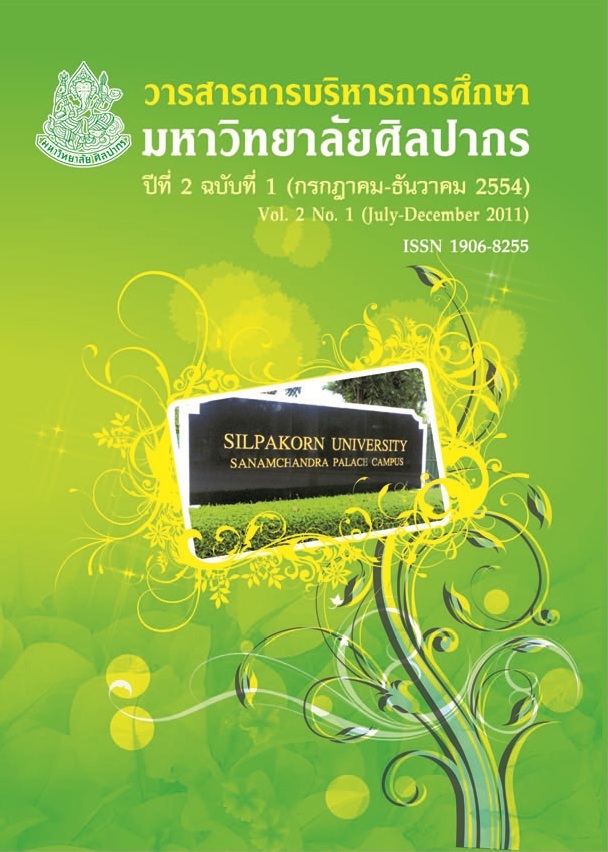ความฉลาดทางอารมณ์ของผู้บริหารสถานศึกษาขั้นพื้นฐาน
บทคัดย่อ
การวิจัยครั้งนี้ มีวัตถุประสงค์เพื่อทราบ 1) องคป์ ระกอบความฉลาดทางอารมณ์ของผู้บริหารสถานศึกษาขั้นพื้นฐาน 2) รูปแบบความฉลาดทางอารมณ์ของผู้บริหารสถานศึกษาขั้นพื้นฐาน และ 3) ผลการยืนยันรูปแบบความฉลาดทางอารมณ์ของผู้บริหารสถานศึกษาขั้นพื้นฐาน กลุ่มตัวอย่างและเครื่องมือที่ใช้ในการวิจัยประกอบด้วย 1) กลุ่มผู้เชี่ยวชาญจำนวน 9 คน ใช้แบบสัมภาษณ์กึ่งโครงสร้าง 2) กลุ่มตัวอย่าง ประกอบด้วยโรงเรียนประถมศึกษา 120 โรงเรียน ผู้ให้ข้อมูล คือ ผู้อำนวยการสถานศึกษา หัวหน้าฝ่ายวิชาการ ครูผู้สอน และประธานคณะกรรมการสถานศึกษา รวมผู้ให้ข้อมูลทั้งสิ้น 480 คน ใช้แบบสอบถามที่เกี่ยวกับความฉลาดทางอารมณ์ของผู้บริหารสถานศึกษาขั้นพื้นฐานมีค่าความเชื่อมั่น 0.987 3) กลุ่มผู้เชี่ยวชาญ จำนวน 5 คน ใช้แบบสอบถามความคิดเห็นในการยืนยันรูปแบบ สถิติที่ใช้ในการวิเคราะห์ข้อมูล ได้แก่ ค่าความถี่ ค่าร้อยละ ค่าเฉลี่ย ส่วนเบี่ยงเบนมาตรฐาน การวิเคราะห์องค์ประกอบเชิงสำรวจ การวิเคราะห์ความสัมพันธ์เชิงสาเหตุ และการวิเคราะห์เนื้อหา
ผลการวิจัยพบว่า
1. องค์ประกอบความฉลาดทางอารมณ์ของผู้บริหารสถานศึกษาขั้นพื้นฐาน ประกอบด้วย 7 องค์ประกอบ ดังนี้ 1) ภาวะผู้นำ 2) ความสัมพันธ์ระหว่างบุคคล 3) การสร้างสมรรถนะทีมงาน 4) ความรับผิดชอบต่อสังคม 5) การเป็นผู้นำการเปลี่ยนแปลง 6) การมีความสุขในชีวิต และ 7) การตระหนักในอารมณ์ตนเอง
2. รูปแบบความฉลาดทางอารมณ์ของผู้บริหารสถานศึกษาขั้นพื้นฐานเป็ นความสัมพันธ์เชิงสาเหตุของพหุองค์ประกอบที่มีความสัมพันธ์กัน ประกอบด้วย ภาวะผู้นา ความสัมพันธ์ระหว่างบุคคล ความรับผิดชอบต่อสังคม การเป็นผู้นำการเปลี่ยนแปลง การมีความสุขในชีวิต และการตระหนักในอารมณ์ตนเอง ซึ่งมีอิทธิพลต่อการสร้างสมรรถนะทีมงานทั้งโดยทางตรงและทางอ้อมอย่างมีนัยสำคัญ
3. ผลการยืนยันรูปแบบความฉลาดทางอารมณ์ของผู้บริหารสถานศึกษาขั้นพื้นฐาน พบว่า มีความเหมาะสม มีความเป็นไปได้ เป็นประโยชน์ และถูกต้องครอบคลุม สอดคล้องกับกรอบแนวคิดทฤษฎีการวิจัย
EMOTIONAL INTELLIGENCE OF ADMINISTRATORS IN BASIC EDUCATION SCHOOL
The purposes of this research were to determine: 1) the components of emotional intelligence of administrators in basic education school 2) the model of emotional intelligence of administrators in basic education school and 3) the confirmation model of emotional intelligence of administrators in basic education school. Samples and instruments used in the research include : 1) 9 specialists and related persons using semistructured interviews ; 2) 120 basic education schools and the respondents were school directors, academic department’s chiefs, teachers and school board committee’s chairpersons using questionnaires with the reliability of 0.987; and 3) 5 specialists using opinionnaire. The statistics for analyzing the data were frequency, percentage, mean, standard deviation, exploratory factor analysis, path analysis and content analysis.
The results of this research found that:
1. The components of the emotional intelligence of administrators in basic education school were 1) leadership, 2) interpersonal relationship, 3) team capability, 4) social responsibility, 5) change agent, 6) happiness, and 7) self awareness.
2. The model of the emotional intelligence of administrators in basic education school was a
multivariate causal relationship model consisted of 7 principal components, namely leadership, interpersonal relationship, social responsibility, change agent, happiness, and self awareness which affected team capability in both direct and indirect effect significantly.
3. The confirmation model of emotional intelligence of administrators in basic education school was found propriety, feasibility, utility and accuracy with the theory, principles and concept of the research.




